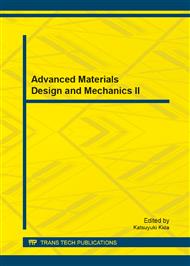p.177
p.181
p.189
p.195
p.199
p.203
p.207
p.211
p.215
Thermal Analysis of Hydration Heat in Mass Concrete with Different Cement Binder Proportions
Abstract:
This study is conducted to evaluate analytically the effect of cement binder proportions (ordinary Portland cement, blast-furnace slag and fly ash) on the hydration heat of mass concrete with specific compressive strength of 30 MPa. Two types of blended concretes were mixed; binder of PSLB_352 consists of ordinary Portland cement (OPC) : blast-furnace slag (BFS) : fly ash (FA) = 3 : 5 : 2 and binder of PSLB_442 comprise OPC : BSF : FA = 4 : 4 : 2. For comparison, a control concrete mixture was mixed with commercial low-heat cement. To measure temperature characteristics due to hydration heat of each mixture, large concrete blocks were cast and temperature within concrete blocks was measured until the equilibrium temperature was reached. Finite element model was developed for predicting hydration heat of mass concrete based on thermal characteristics of mass concrete derived from large concrete blocks. The effect of cement binder proportions on the hydration heat of mat foundation was evaluated by developed finite element model.
Info:
Periodical:
Pages:
199-202
DOI:
Citation:
Online since:
August 2013
Authors:
Keywords:
Price:
Сopyright:
© 2013 Trans Tech Publications Ltd. All Rights Reserved
Share:
Citation:


